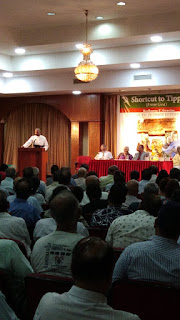In fact, it appears that these phrases were cleverly designed to vitiate the public discourse in the state, one small, innocuous, drop at a time, till we wake up one fine morning to realise that the entire well has been poisoned. Impossible to address them individually, it will be even more difficult if not impossible, to address the damage once these little provocations have done their work, which is to provoke the communal passions of those in the state, and principally the passions of those groups who have been constructed as the “majority community”. We know, of course, that there is no such thing as a majority or minority community. Rather some communities are, often consciously and deliberately, designed as majority, while others are pushed into minority positions. These news bytes I refer to seemed similarly designed to not just further deepen the minoritisation that has been systematically taking place of the Catholics in the state, but also to create an emotionally volatile situation in the state, such that violence seems to be the only possible response.
Marveling at the wickedness of this stratagem, I realised that it was only a matter of time before we started behaving as Catholics, Muslims, and Hindus, rather than as members of a common political community. Indeed, this time is already here, and to some extent has been here since the integration of Goa into the Indian Union in 1961. It is just that things are going to soon reach a whole new level of crazy in the coming years.
If it is to be the case that we are going to have to start operating as Catholics first, what is to be the nature of this Catholic politics in Goa? I am personally convinced that these politics should most certainly not be identitarian in nature. Rather they should be ethical. To an extent we do not really have a choice, since even the Catholics in the state have taken up ethical positions, the opposition to the routing of the Konkan railway, for example, or tourism in the state, it has often been represented as communal in nature.
 |
The Latin inscription reads: "We shall attain the excellence of virtue with the grace of God and the effort of our will." |
Nevertheless, there is something we can do, which to my mind
has not yet been attempted in the state. It is my proposal that we shift to
cultivating among Goans a politics of the classical and Christian virtues, and
thus have a long-term project in mind, rather than focus solely on short-term
issues, where the agenda is set not by us, but by others. Sun Tzu, the Taoist
author of the treatise The Art of War would no doubt agree with me that one
should always choose the terrain of battle, rather than fight on a terrain
chosen by the opponent.
The appeal of cultivating the virtues among Catholics is
immediately obvious. In an age where cynicism and the naked pursuit of either
power or pleasure, or worse, both, is the norm in Goan politics, whether social
or electoral, speaking of the virtues will offer an ethical framework where we
can pause and evaluate our actions and those of others. Additionally, given its
classical origins, these virtues are in fact shared across religious groups.
Thus, while our effort will be directed primarily to Catholics, this discourse
can just as easily be shared across religious boundaries.
Prudence, Justice,
Temperance, and Fortitude; these are the cardinal, or moral, virtues, handed
down to us via the Hellenistic (the Graeco-Roman) world and further elaborated
on within the Catholic intellectual tradition. To these four cardinal virtues,
these Christian intellectuals, added the theological virtues, of hope, faith,
and charity. In a time when social politics seems to have largely forgotten that
this world is not restricted to the material, but has a spiritual or
transcendental element, these latter virtues would offer us a way to move beyond
the superficiality of the cynical politics of our age.
Another reason why I
believe that the cultivation of the virtues is a good idea is because it also
involves an intellectual element. One has to grow in the three intellectual virtues: knowledge, understanding and eventually wisdom. The reduction of our
horizon to just the material world, and our activities essentially to (frenzied)
consumption, has resulted in a situation where all we are interested in is
accumulation of knowledge, or information. There is largely no movement toward
relating that information to obtain understanding, and then moving on to the
contemplation of these understandings that leads to wisdom.
There is no
development of the virtuous life if it is not accompanied by a life of the mind.
Classically there was an understanding of the crucial role that the intellect
played in strengthening the will and tempering our desires. It must be
acknowledged that despite our best efforts we in Goa have been lacking on this
front. The reason for this lack is not, as I have suggested above, for lack of
trying, but because our intellectual efforts have been largely restricted to the
secular frame of liberal modernity. Left almost entirely untouched is the deep
river of the Catholic intellectual tradition, which boasts persons like St.
Thomas Aquinas, St. Augustine, and by adoption the classical philosophers like
Aristotle. How many Catholics in Goa are aware, in any depth, of this
intellectual tradition?
An engagement with this tradition will allow us to move
beyond the rousing of the faithful for short-term political movements. Rather it
will develop within them the ability to think deeply, and independently, and
more importantly act instinctively to prefer virtuous living. All too often,
despite our protestations, too many of us are invested in the deeply unvirtuous
public life that marks contemporary Goa. If you can’t beat them, join them,
seems to be our attitude.
A politics that rests on the practice of the virtues
seems to me the best way forward into the mess that will mark twenty-first
century Goa. It is a politics that is categorically not identitarian, and that
with time will offer a solid mass of virtuous actors who will block the further
descent of Goa into the darkness that threatens.
(A version of this post was first published in the O Heraldo dated 14 Dec 2022).





